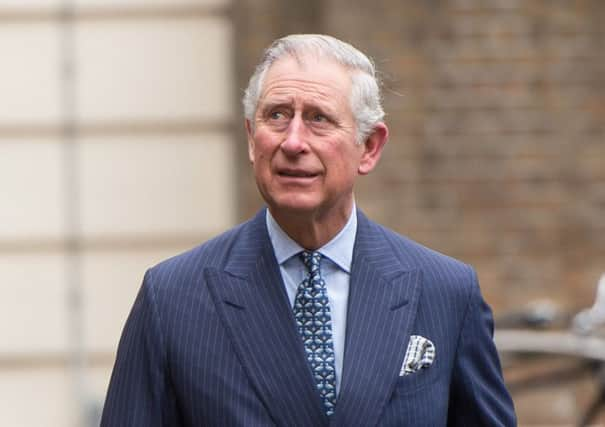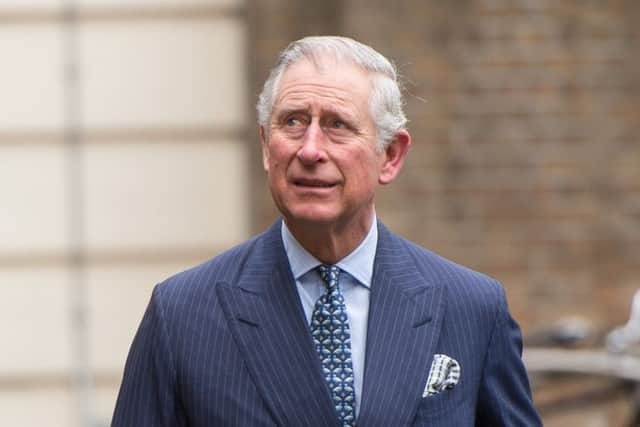Prince of Wales ‘black spider’ letters published


Twenty-seven letters – ten from Charles to ministers, 14 by ministers and three letters between private secretaries – were published yesterday following a long-running legal battle.
Charles is understood to be “disappointed” that his memos – written between September 2004 and March 2005 – have finally been published.
Advertisement
Hide AdAdvertisement
Hide AdClarence House defended his decision to write the letters, with a spokesman saying: “The publication of private letters can only inhibit his ability to express the concerns and suggestions which have been put to him in the course of his travels and meetings.”


But his top aide suggested the experience was unlikely to put him off raising matters that are brought to his attention in the future.
Charles’s principal private secretary, William Nye, said: “He will think about how he deals with things but I think he’ll continue to want to reflect the views that he hears from members of the public, and talk about things that matter to our society and the world to ministers of any government.”
There were no handwritten “black spider” letters among the batch released – so-called because of the black ink used by the prince in some correspondence and his habit of underlining words – and all were typed.
In one detailed and lengthy letter to the then-prime minister Tony Blair, dated 8 September 2004, the prince wrote of his concern at the lack of resources for the armed forces fighting in Iraq.
He said problems with deploying new Oxbow surveillance technology, which he described as a “major advance” for the military, were “being frustrated by the poor performance of the existing Lynx aircraft in high temperatures”.
“Despite this, the procurement of new aircraft to replace the Lynx [helicopter] is subject to further delays and uncertainty due to the significant pressure on the defence budget,” Charles said.
“I fear this is just one more example of where our armed forces are being asked to do an extremely challenging job (particularly in Iraq) without the necessary resources.”
Advertisement
Hide AdAdvertisement
Hide AdMr Blair replied that “limitations of the existing platform” were well known to the Ministry of Defence (MoD, and the budget for the coming years included investment in helicopters.
In the same note to Mr Blair, the prince asked him to put “pressure” on the Department for Environment, Food and Rural Affairs (Defra) over bureaucratic burdens facing farmers.
Charles wrote: “Suffice it to say that any pressure which you can bring to bear on Defra through the panel for regulatory accountability, which you told me you are chairing, would be much appreciated.”
In another letter to Mr Blair, the prince described opponents of a badger cull as “intellectually dishonest” and advocated culling to tackle tuberculosis in cattle.
Writing in February 2005, Charles criticised the “badger lobby” for not minding about the slaughter of cattle which contract the disease but objecting to the killing of badgers.
He urged Mr Blair to “look again at introducing a proper cull of badgers where it is necessary”, warning that the rising number of cases of TB in cattle was the most pressing and urgent problem facing the agricultural sector.
As of March last year, £274,481.16 had been spent by the government on legal fees to try to block the publication of the letters, which were released following a ten-year campaign by Guardian journalist Rob Evans after a freedom of information request.
The money was spent by eight government departments as former attorney general Dominic Grieve tried to prevent their release, claiming it would undermine the principle of the heir to the throne being politically neutral.
Advertisement
Hide AdAdvertisement
Hide AdThe real cost is likely to be much higher due to ongoing legal wrangling since the figures were published.
Charles also described a European regulation to restrict practitioners of herbal medicine as like “using a sledgehammer to crack a nut”.
He also complained to Mr Blair about regulatory body the Office of Fair Trading (OFT), describing it as a “serious obstacle” for dairy co-operatives. He added that Mr Blair had said he would look at the matter and “see if there was anything which could be done to help the OFT to take a wider view”.
Mr Blair, in his response dated 11 October 2004, reminded the prince of the OFT’s independence, adding: “I couldn’t influence them even if I wanted to.”
In February 2005, Charles complained about the “dominant position” of retailers and its effect on British farmers.
He welcomed proposals for a Buyers’ Charter and even suggested Mr Blair appoint a particular person, whose name was redacted before the publication of the letters, as an independent arbitrator of the body.
Other issues raised by the prince included the plight of the albatross and the fate of a Chilean fish.
Both Mr Blair and the prince signed their letters to one another “Yours ever” and Charles often apologised for the length of his note, which frequently ran to three or four pages of typed A4.
Advertisement
Hide AdAdvertisement
Hide AdCharles even made a joke about the Freedom of Information Act – the very legislation which enabled the publication of his correspondence – in one of his notes to Mr Blair.
He said: “It was very good to see you again the other day and, as usual, I much enjoyed the opportunity to talk about a number of issues.
“You kindly suggested that it would be helpful if I put them in writing – despite the Freedom of Information Act!”
Guardian editor-in-chief Alan Rusbridger said it was “shocking” the government had wasted public money trying to prevent the publication of the letters.
Former Scottish first minister Alex Salmond said last night he had received “quite a few” letters from Charles and described them as “very intelligent and always worth reading”.
Earlier, as he arrived at Marks & Spencer’s flagship store in London to highlight a work placement scheme between the retailer and the Princes Trust, one of his senior aides ripped the cover off Channel 4 News political correspondent Michael Crick’s microphone when he asked Charles if he was “worried” about the documents being made public.
The prince did not reply but said “very predictable” as he entered the store.
FOLLOW US
SCOTSMAN TABLET AND MOBILE APPS